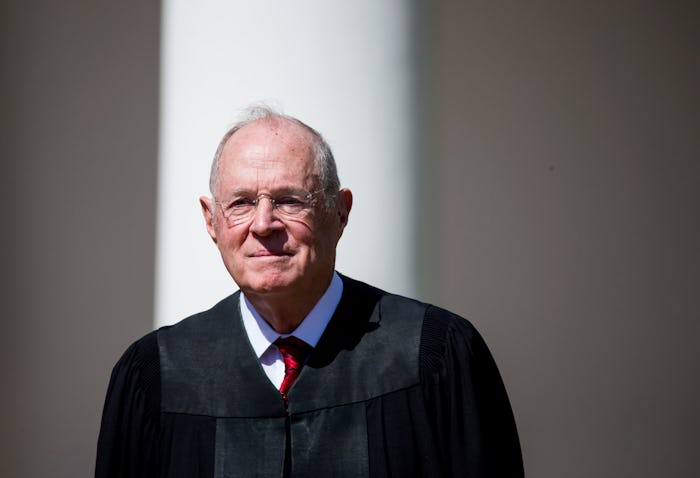News

Justice Anthony Kennedy Is Retiring, & Here’s What That Means For The Supreme Court
After spending 30 years on the Supreme Court, the Associated Press reported on Wednesday afternoon that Justice Anthony Kennedy is retiring. His departure from the bench means that President Donald Trump will have an opportunity to nominate another Supreme Court justice. It also means that, given the current political climate, voters should brace themselves for a tense political battle over the justice's replacement, as he's been the swing vote in some of the most ideological rulings the court has made in the past decade.
The 81-year-old justice was appointed by President Ronald Reagan back in 1988, and is the 14th longest serving justice on the Supreme Court, according to Vox. Kennedy is reliably conservative when it comes to things like campaign finance, business regulations, and the Second Amendment, so without him, those sort of rulings will likely remain unchanged, as reported by Mother Jones.
But he's been the swing vote on some of the biggest cases regarding LGBTQ rights and abortion in the past few years. For example, in 2016, he sided with the more liberal-leaning justices in cases such as Whole Woman's Health v. Hellerstedt, which overturned anti-abortion laws in Texas requiring doctors to have admitting privileges in hospitals to administer abortions, among other TRAP laws. He also wrote the majority opinion to legalize same-sex marriage in 2015, as per NPR. Kennedy had made it very clear, for example, that if a case about the constitutionality of solitary confinement in prisons ever made it to his desk, he'd rule against the practice, according to the American Civil Liberties Union.
Without Kennedy, there will be just four Democrat-appointed justices and four Republican-appointed justices. Legal experts believe what whomever Trump nominates to take Kennedy's place will likely swing even more to the right than their predecessor, especially when it comes to civil and human rights.
But first, Trump has to nominate someone, and then the Senate has to confirm them. On Wednesday, the White House said in a statement that it would start a search immediately. So be prepared for some tiresome Facebook and Twitter feeds in the coming weeks, given the politically charged process.
You might remember that when Justice Antonin Scalia died in February 2016, President Obama nominated Merrick Garland to replace him. But the Republicans, who controlled the Senate at the time and still do at the moment, refused to approve anyone for the empty Supreme Court seat given that it was an election year. What they were really holding out for though was a Republican president to nominate someone that a Republican-led Senate could approve — which is exactly what happened when Trump nominated Neil Gorsuch, who was eventually appointed to the Supreme Court in April 2017.
The combination of a Republican-led Congress and Trump's campaign promises to overturn Roe v. Wade, expand rights for gun owners, and uphold "religious freedoms," among other divisive issues, mean the administration is going to want to move as quickly as possible. It is an election year, after all, which makes Republicans a little hypocritical. But if he waits to nominate someone after the midterms, Trump risks facing a Democrat-led Senate to approve his pick, according to NBC News. The 2018 midterm elections for Congress could easily become about who would uphold the president's nominee or not. Again, brace yourself for a contentious political battle this summer.
Even if Trump does nominate someone immediately and they are appointed to the court, most of these issues wouldn't be decided right away. The Supreme Court often moves at a glacial pace and picks the cases it wants to hear very carefully, given the influence of its rulings.
It could take years, according to Vox, for the Supreme Court to allow states to ban abortion, "reject challenges to capital punishment and solitary confinement," or reverse anti-discrimination laws. Then again, many of the Supreme Court's decisions during the 2017-2018 session have also veered largely to the right and in favor of executive power anyway with both Gorsuch and Kennedy on the bench. Already, cases regarding immigration, capital punishment, Native American land use, and others are expected to be heard in the fall, as per SCOTUS Blog.
So don't sleep on any news about who Trump plans on nominating and when. With the backing of a Republican Congress, Trump has the power to drastically change the tenor of federal laws for decades to come, given that justices are appointed for life. Americans can only hope he understands the responsibility that comes with that power.